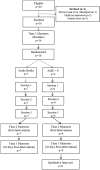Pilot Randomized Trial of Active Music Engagement Intervention Parent Delivery for Young Children With Cancer
- PMID: 27289068
- PMCID: PMC5896608
- DOI: 10.1093/jpepsy/jsw050
Pilot Randomized Trial of Active Music Engagement Intervention Parent Delivery for Young Children With Cancer
Abstract
Objectives: To examine the feasibility/acceptability of a parent-delivered Active Music Engagement (AME + P) intervention for young children with cancer and their parents. Secondary aim to explore changes in AME + P child emotional distress (facial affect) and parent emotional distress (mood; traumatic stress symptoms) relative to controls.
Methods: A pilot two-group randomized trial was conducted with parents/children (ages 3-8 years) receiving AME + P ( n = 9) or attention control ( n = 7). Feasibility of parent delivery was assessed using a delivery checklist and child engagement; acceptability through parent interviews; preliminary outcomes at baseline, postintervention, 30 days postintervention.
Results: Parent delivery was feasible, as they successfully delivered AME activities, but interviews indicated parent delivery was not acceptable to parents. Emotional distress was lower for AME + P children, but parents derived no benefit.
Conclusions: Despite child benefit, findings do not support parent delivery of AME + P.
Keywords: cancer; coping; music therapy; parents; traumatic stress symptoms; young children.
© The Author 2016. Published by Oxford University Press on behalf of the Society of Pediatric Psychology. All rights reserved. For permissions, please e-mail: journals.permissions@oup.com
References
-
- Barrera M., D'agostino N. M., Gibson J., Gilbert T., Weksberg R., Malkin D. (2004). Predictors and mediators of psychological adjustment in mothers of children newly diagnosed with cancer. Psycho-Oncology, 13, 630–641. - PubMed
-
- Barrera M. E., Rykov M. H., Doyle S. L. (2002). The effects of interactive music therapy on hospitalized children with cancer: A pilot study. Psycho-Oncology, 11, 379–388. - PubMed
-
- Bennett E., English M. W., Rennoldson M., Starza-Smith A. (2013). Predicting parenting stress in caregivers of children with brain tumours. Psycho-Oncology, 22, 629–636. - PubMed
-
- Best M., Streisand R., Catania L., Kazak A. E. (2001). Parental distress during pediatric leukemia and posttraumatic stress symptoms (PTSS) after treatment ends. Journal of Pediatric Psychology, 26, 299–307. - PubMed
-
- Bradt J., Dileo C., Grocke D., Magill L. (2011). Music interventions for improving psychological and physical outcomes in cancer patients. Cochrane Database of Systematic Reviews, CD006911. - PubMed
Publication types
MeSH terms
Grants and funding
LinkOut - more resources
Full Text Sources
Other Literature Sources
Medical


